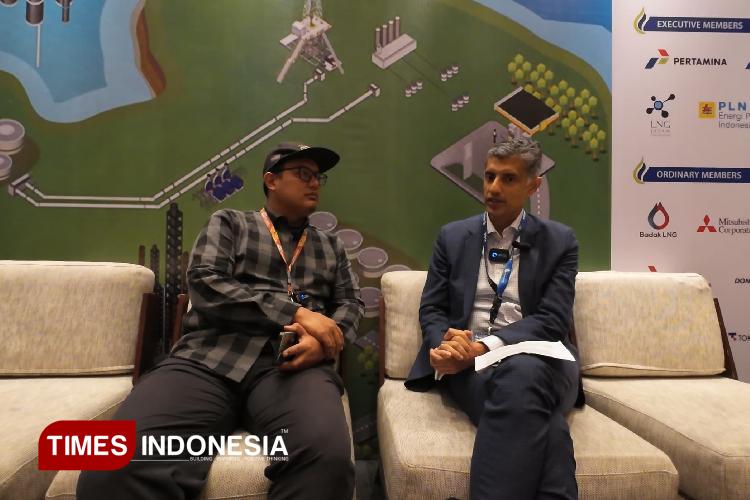Senior Partner at McKinsey & Company: Indonesia Could Lead The World in Tropical Energy Solutions

TIMESINDONESIA, JAKARTA – Amidst global geopolitical tensions, energy crises, and an urgent push for decarbonization, natural gas and LNG (liquefied natural gas) are emerging as strategic pillars in regional energy discourse.
In an exclusive interview, Azam Mohammad, Senior Partner at McKinsey & Company, emphasized the pivotal role of gas in bridging current needs with future sustainability not just as a transitional fuel, but as part of a long-term energy solution that is reliable, affordable, and environmentally sustainable.
Advertisement
“Optimizing the use of domestic gas, can help meet energy access goals while reducing reliance on higher-emission fuels. The integration of gas with renewable sources also enhances energy system flexibility and resilience,” said Azam in an exclusive interview with TIMES Indonesia on the sidelines of the IndoGAS 2025 event in Jakarta, Tuesday (24/6/2025).
As LNG demand continues to rise with Southeast Asia becoming a key growth hub, collaboration among major producers like Australia, Indonesia, and Malaysia is critical. Azam emphasized that intra-ASEAN LNG trade could create a more robust and self-sufficient energy ecosystem.
“I introduced the concept of LNG Super Highways integrated regional LNG supply routes that promote secure, affordable, and lower-emission energy. This is not just about energy trade it’s about enabling investment, creating jobs, and cutting carbon footprints compared to conventional fossil fuels,” he noted.
Azam also addressed the importance of cross-border infrastructure, including gas pipelines, floating LNG terminals, and carbon capture and storage (CCS) facilities. Projects such as the Cross-Border Cooperation Initiatives (CCI) could accelerate regional integration and improve energy system efficiency.
Looking to the future, Azam predicted cross-border trade not only in LNG, but also in carbon and hydrogen for instance, with carbon captured in Japan or South Korea being stored in Indonesia or Malaysia, or with low-cost hydrogen from Malaysia exported to Japan.
“This is how energy systems will evolve in ASEAN,” he explained.
Despite the potential, Azam acknowledged significant challenges, particularly around regulatory frameworks and investment climate. Energy infrastructure, especially in gas, requires high upfront capital and long-term returns.
“To attract investment, governments must create a stable and transparent regulatory environment that ensures returns,” he said. He called for innovative financing mechanisms that reduce capital costs and attract both traditional and new types of investors.
"We're no longer in a world of cheap capital. Capital is expensive. So, we need new financing structures based on project risk profiles,” he emphasized.
In response to concerns that gas might be counterproductive to renewables, Azam offered a nuanced view. In reality, gas can serve as a stabilizer for intermittent renewable sources like solar, which, while increasingly cost-competitive, still face reliability issues.
Combining gas with renewables in hybrid systems — such as small-scale LNG plants in remote islands paired with solar panels — can provide 12 to 24-hour energy access, reduce emissions, and ensure more consistent electricity supply. This model is particularly suited for archipelagic nations like Indonesia and the Philippines.
Regarding Indonesia, Azam praised the country as a pioneer in the global LNG industry. Given its geographic diversity and abundant natural resources, Indonesia has immense potential to become a hub for decentralized energy innovation particularly in developing hybrid energy solutions for remote and underserved areas.
He also pointed to maritime transport as a major opportunity, suggesting Indonesia explore LNG or ammonia as cleaner marine fuels. “Indonesia could lead the world in tropical energy solutions,” he said confidently.
As the global energy map undergoes rapid transformation, voices like Azam Mohammad’s shed light on the critical role of gas in shaping a resilient and inclusive energy future. Far from being a mere bridge fuel, gas particularly LNG holds the potential to drive innovation, unlock regional cooperation, and deliver sustainable growth across ASEAN.
For countries like Indonesia, this moment presents not just a challenge, but a rare opportunity to lead. With bold strategies, cross-border collaboration, and a firm commitment to cleaner energy systems, Southeast Asia can redefine its energy narrative one that is secure, affordable, and environmentally responsible. (*)
**) Ikuti berita terbaru TIMES Indonesia di Google News klik link ini dan jangan lupa di follow.
| Editor | : Khodijah Siti |
| Publisher | : Ahmad Rizki Mubarok |

